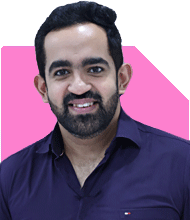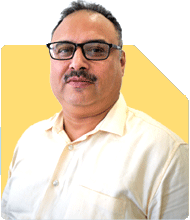How Can I Plan My Finances at 43 with a Family and Investment Portfolio?
Ramalingam Kalirajan |8092 Answers |Ask -Follow
Mutual Funds, Financial Planning Expert - Answered on Aug 23, 2024
He has an MBA in finance from the University of Madras and is a certified financial planner.
He is the director and chief financial planner at Holistic Investment, a Chennai-based firm that offers financial planning and wealth management advice.... more

Hi Sir, I am a 43 years salaried employee with family of Mother (75 years), Spouse (40 years) and a new born baby boy of 1 month. Below is current monthly break up of my salary Income 90000 Investments 9500 Expense 31700 Savings 48800 I have below investments and savings in bank account ~13 lakhs with no open loans. 2 flats worth approximately 1.35 Cr., Mutual Funds 386146 Fixed Deposits 254429 Stocks 148923 PPF 298731 NPS 183000 and a term insurance of 1 Cr. No personal Health insurance for any of the family members, but having a corporate health insurance. I request your guidance and support to have better Financial planning for future. Short term goal is to purchase a 4 wheeler ~ 17 lakh (Nexon or mini SUV) and may be short vacations every year with family. Long Term goals not very sure how much will be required. Child education Retirement Corpus Child Marriage Thank in advance !
Your current insurance coverage includes a term insurance of Rs. 1 crore. However, you lack personal health insurance for your family. Corporate health insurance alone might not be sufficient.
Immediate Action Items
Personal Health Insurance
Corporate health insurance can be inadequate in emergencies. Consider getting separate health insurance for your family. Coverage of Rs. 10-15 lakhs per member is advisable. Look for policies offering maternity benefits and child health cover, considering your newborn.
Emergency Fund Enhancement
With Rs. 13 lakhs in savings, your emergency fund is robust. Ensure it covers at least six months of expenses. A portion could be kept in liquid funds for better returns. It keeps your money accessible and growing.
Short-Term Goals
Purchasing a 4-Wheeler
You plan to buy a vehicle worth Rs. 17 lakhs. Consider saving in a recurring deposit or a short-term debt fund. It ensures safety and liquidity. It will help in gathering the required amount in a year or two.
Annual Family Vacations
Allocate a portion of your savings specifically for vacations. A separate savings account or a recurring deposit could be useful. It allows you to enjoy without affecting other financial goals.
Long-Term Goals
Child Education
Education costs are rising. Start an SIP in an equity mutual fund for 15-18 years. It can help accumulate a significant corpus. Investing early ensures you take advantage of compounding.
Retirement Corpus
Retirement planning is crucial. Consider increasing your NPS contributions. NPS offers tax benefits and ensures a steady income post-retirement. Also, increase your SIPs in balanced or equity mutual funds. A diversified portfolio will help in building a solid retirement corpus.
Child Marriage
This is another long-term goal. An SIP in a balanced mutual fund with a 20-25 year horizon is suitable. It will give you the benefit of equity growth and debt stability.
Review of Current Investments
Mutual Funds
Your mutual fund investment of Rs. 3.86 lakhs is a good start. Diversification is key. Ensure your funds cover large-cap, mid-cap, and small-cap categories. Actively managed funds outperform index funds over the long term. Consider consulting with a certified financial planner to review your portfolio.
Fixed Deposits
Your fixed deposits are safe but offer lower returns. Consider moving a portion to debt funds. Debt funds can offer better tax efficiency and returns compared to fixed deposits.
Stocks
Your stock investment of Rs. 1.48 lakhs could be diversified further. Avoid concentrating on a few stocks. Consider investing in blue-chip companies with a proven track record. Again, actively managed mutual funds can be more reliable than direct stock picking.
PPF
Your PPF investment is stable and tax-efficient. Continue contributing to it. It serves as a good debt component in your portfolio. PPF should be part of your long-term strategy.
NPS
NPS is a good choice for retirement. It offers tax benefits and long-term growth. Consider increasing your monthly contribution. It will help you build a larger retirement corpus.
Final Insights
Your current financial situation is healthy. You have good savings and a balanced investment portfolio. However, there's room for improvement.
Increase your health insurance coverage. Corporate health insurance alone might not be enough.
Enhance your emergency fund. Consider liquid funds for better returns.
Start saving for your short-term goals like purchasing a car and vacations. Use safe investment options.
Plan for your child's future with SIPs in equity funds. Early investment will ensure you meet rising education costs.
Focus on retirement planning by increasing your NPS contributions and SIPs in equity and balanced funds.
Diversify your investments in mutual funds and stocks. Actively managed funds are preferable for long-term growth.
By taking these steps, you will be on a solid path to financial security. Regular reviews with a certified financial planner can ensure you stay on track.
Best Regards,
K. Ramalingam, MBA, CFP,
Chief Financial Planner,
www.holisticinvestment.in
You may like to see similar questions and answers below
Ramalingam Kalirajan |8092 Answers |Ask -Follow
Mutual Funds, Financial Planning Expert - Answered on May 02, 2024
Ramalingam Kalirajan |8092 Answers |Ask -Follow
Mutual Funds, Financial Planning Expert - Answered on May 14, 2024
Ramalingam Kalirajan |8092 Answers |Ask -Follow
Mutual Funds, Financial Planning Expert - Answered on May 18, 2024
Aamish Dhingra |13 Answers |Ask -Follow
Life Coach - Answered on Mar 10, 2025
Milind Vadjikar |1097 Answers |Ask -Follow
Insurance, Stocks, MF, PF Expert - Answered on Mar 10, 2025
Milind Vadjikar |1097 Answers |Ask -Follow
Insurance, Stocks, MF, PF Expert - Answered on Mar 10, 2025
Sushil Sukhwani |589 Answers |Ask -Follow
Study Abroad Expert - Answered on Mar 10, 2025
Radheshyam Zanwar |1397 Answers |Ask -Follow
MHT-CET, IIT-JEE, NEET-UG Expert - Answered on Mar 10, 2025
Baqar Iftikhar Naqvi |113 Answers |Ask -Follow
Start-up Mentor - Answered on Mar 10, 2025
Patrick Dsouza |1005 Answers |Ask -Follow
CAT, XAT, CMAT, CET Expert - Answered on Mar 10, 2025
Radheshyam Zanwar |1397 Answers |Ask -Follow
MHT-CET, IIT-JEE, NEET-UG Expert - Answered on Mar 10, 2025
Prof Suvasish Mukhopadhyay |480 Answers |Ask -Follow
Career Counsellor - Answered on Mar 10, 2025
Prof Suvasish Mukhopadhyay |480 Answers |Ask -Follow
Career Counsellor - Answered on Mar 10, 2025
























